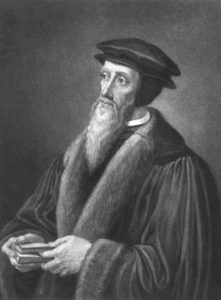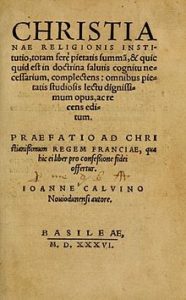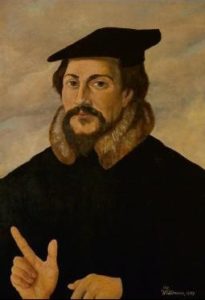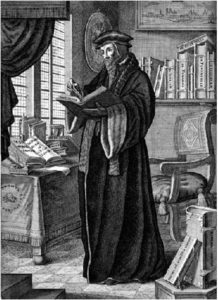Calvin’s ‘Institutes’: Theological Content and Growth
Yale Church historian and Calvinian scholar Bruce Gordon writes that Calvin’s ‘Institutes’ went through revisions for more than twenty years because they embodied and reflected Calvin’s continuous study of Scripture, his deepening grasp of the theological tradition of patristic and medieval fathers, his pastoral experience, and the doctrinal controversies he was involved in over the years. Herman Selderhuis described this colorfully: “The ‘Institutes’ had drifted into the market as a sailboat, but by 1559 it had grown into a cargo ship, increasing from six to eighty chapters.â€
Caspar Olevianus (1536-1587), now famous as the co-author of the Heidelberg Catechism (1563), seemed to have a real knack for concisely articulating biblical truths, summarized succinctly Calvin’s ‘Institutes’ in this way:
Man being at first created upright, but afterwards being not partially but totally ruined, finds his entire salvation out of himself in Christ, to whom being united by the Holy Spirit freely given, without any foresight of future works, he thereby obtains a double blessing—namely, full imputation of righteousness, which goes along with us even to the grave, and the commencement of sanctification, which daily advances till at length it is perfected in the day of regeneration or resurrection of the body, and this, in order that the great mercy of God may be celebrated in the heavenly mansions throughout eternity.
There are three primary editions of the “Institutes†from 1536 to 1559. The 1536 Institutes might be called “A Catechetical Institutes†(6 chapters). It is focused on grounding God’s people in the biblical faith like a catechism. The format was borrowed from Calvin’s first generation Reformation father, Martin Luther. It has six chapters: 1) Faith; 2) Commandments; 3) Lord’s Prayer; 4) Sacraments; 5) False Sacraments of Roman Catholicism; and 6) Christian Freedom and the relationship of the Christian to the church and the state. This 1536 first edition is a summary of the Christian faith that is like a catechism.
The second, and larger edition of 1539/1541 might be called “A Thematical, Biblical-Theological Institutes†(17 chapters). It is a noticeably larger expanision with seventeen chapters: 1) Knowledge of God; 2) Knowledge of Man and Freewill; 3) The Law; 4) Faith (Apostle’s Creed); 5) Repentance; 6) Justification by Faith and Good Works; 7) Similarities and Differences between the Old and New Testaments; 8) Predestination and Providence; 9) Prayer (Lord’s Prayer); 10) Sacraments; 11) Baptism; 12) Lord’s Supper; 13) Five Ceremonies Falsely Called Sacraments (contra Roman Catholicism); 14) Christian Freedom; 15) Power of the Church; 16) Civil Government; and 17) The Christian Life. This 1539/1541 edition is a handbook on the Christian Faith to help believers to study their bibles and to know the word of God. The format of this edition was built on Calvin’s comprehensive study of Paul’s Epistle to the Romans, as well as some influences from Reformation fathers, Martin Luther and Philip Melanchthon (1497-1560), (particularly Melanchthon’s Lutheran Theology entitled “Loci Communes†published first in 1521).
Here is an overview and summary of each chapter of Calvin’s ‘Institutes’ (1541 edition) with a memorable quote from Calvin for catechetical instruction for Christ’s Church:
- Preface to King Francis I: “True Christians, True Churchâ€
- The Knowledge of God: “Covenant revealed knowledge of God as He is toward usâ€
Calvin: “All the wisdom we possess, that is to say, true and sound wisdom, consists of two parts: knowledge of God and knowledge of ourselves.â€
- The Knowledge of Man and Free Will: “Covenant-image-bearer, but fallen through covenant breaking, and thus no longer free, but enslaved to sinâ€
Calvin: “Man, having been created in God’s image, was endowed with gifts and superior powers which testified to His Creator’s extraordinary generosity toward him…Through his ingratitude, he quickly made himself unworthy of all the benefits which God had given him. The heavenly image he bore therefore erased; being estranged from God by sin he was likewise deprived of his share in the blessings which can only be had in Him.â€
- The Law: “An enchanted mirror that reveals holy, just, good, and all-wise God, the reason for man’s existence, and the perfect, righteous, good manâ€
Calvin: “The Law reveals our need of God’s mercy … The Law is a standard of perfect righteousness.â€
- Faith, with an Explanation of the Apostle’s Creed: “Faith that is given by God that is not perfect, but rests entirely upon God’s truth with confidence and assuranceâ€
Calvin: A firm and certain knowledge of God’s goodwill to us which, being founded on the free promise given in Jesus Christ, is revealed to our minds and sealed in our hearts by the Holy Spirit.â€
- Repentance: “The entire Christian Life from beginning to end should be characterized by repentanceâ€
Calvin: “The essence of repentance is that, taking leave of ourselves, we turn to God, and forsaking our former thoughts and intentions we adopt new ones …It is a turning of our life to follow God and the path which He shows us, a turning produced by a genuine and unfeigned fear of God, and consisting in mortification of our flesh and of the old man, and in vivification of the Spirit.â€
- Justification by Faith and the Merits of Works: “Declared righteous based on the merit of Christ’s works, all of our works in Him accepted as His sons when brought in sincerityâ€
Calvin: “It teaches us to look away from our works and to look only to God’s mercy and to the perfect holiness of Christ …. A man is righteous not in himself but because Christ’s righteousness is made over to him by imputation.â€
- The Similarity and Difference between the Old and New Testaments: “One God, One People, One Covenant Storyâ€
Calvin: “The covenant made with the fathers of old, in its substance and reality, is so similar to ours that it can be said to be the very same. It differs only in the way it is dispensed.â€
- The Predestination and Providence of God: “True believers will never lose their faith; true believers will never lose their wayâ€
Calvin: “We can predestination God’s eternal counsel by which He has determined what He wishes to do with each and every person … Thus, according to the end for which a person has been created, we say that he is predestined to death or life … Providence is what we call the order which God observes in governing the world and in directing all things.â€
- Prayer, with an Explanation of Our Lord’s Prayer: “Faith makes itself known from one’s heart in communion and union with Godâ€
Calvin: “We are taught by faith to know that all the goodness which we need and which we ourselves lack is in God and in His Son, our Lord Jesus Christ, in whom the Father has placed all the bounty of His blessing and grace, so that we may all draw from Him as from a most plentiful spring. It…remains for us to seek from Him what we know to be in Him, and to ask Him for it in prayer and supplication.â€
- The Sacraments: “Visible words of promises that bring the very presence of Christ and His grace, received by faith, sealed by the Holy Spiritâ€
Calvin: “It is an outward sign by which our Lord represents and testifies His goodwill toward us, in order to sustain and strengthen the weakness of our faith.â€
- Baptism: “Outward sign of an inward reality of regeneration and cleansing from sin authenticated by the Holy Spiritâ€
Calvin: “In the Gospel our washing and sanctification are proclaimed to us, and that by baptism this proclamation and message are signed and sealed.â€
- The Lord’s Supper: Outward sign of an inward reality of growth in faith and sanctification in Christ, authenticated by the Holy Spiritâ€
Calvin: “We call it the Lord’s Supper or Eucharist, because in it we are spiritually fed and nourished by the goodness of our Lord, and we in turn give Him thanks for His kindness.â€
- The Five Ceremonies Falsely Called Sacraments: Confirmation, Penance, Extreme Unction, Ecclesiastical Orders, and Marriage: “Primary tenants of ‘Romanism’/False Medieval Roman Catholic Religion of Idolatryâ€
Calvin: “…Belief in the seven sacraments has been so common among men and so widely discussed in debates and sermons, that from very early times it has been rooted in men’s hearts and is still embedded there. I thus thought it worthwhile to consider separately and more closely the remaining five, which are generally counted among the Lord’s sacraments, and having revealed their complete falsity, to show the untutored what they are like and how, up until now, they have been wrongly taken for sacraments.â€
- Christian Freedom: “Free to live as one was created to live under the authority of God and His Word, enjoying peace of conscienceâ€
Calvin: “Freedom from bondage to the law in Christ … Freedom to obey without constraint God’s will … Freedom in the use of indifferent things.â€
- The Power of the Church: “Possessing the keys to the kingdom of God (special grace), given graciously by grace by Christ, to be administered as steward-servants under the authority of God’s special revelation in His Wordâ€
Calvin: “Power is conferred solely by God’s Word. Those who rightly use such power look on themselves simply as Christ’s servants and as stewards of the mysteries of God.â€
- Civil Government: “Possessing the sword of the kingdom of God (common grace), given graciously by Christ, to be administered as steward-servants under the authority of God’s general revelation in His creation and in conscienceâ€
Calvin: “Magistrates are God’s servants/ministers … They must remember that they are deputies of God, they must make every effort and take every care in all they do to represent to men an image of God’s providence, protection, goodness, mildness and justice.â€
- The Christian Life: “Lifelong learning that we are not our own, we are God’s, and we are therefore to learn to be like Christ in our love to God and neighbor, specifically in our self-denial in our cross-bearing pilgrimage, stewardship, and meditation upon the future life.
Calvin: “Scripture teaches that holiness is the purpose of our calling, which we must constantly keep in view if we would truly respond to God … A golden rule: we are not our own …Let us therefore forget ourselves as much as we can—ourselves and everything around us.â€
In 1559, the descriptive heading (“book jacket blurbâ€) of the ‘Institutes’ read: “[The Institutes of the Christian Religion] now first arranged in four books and divided by definite headings in a very convenient manner so that it can almost be regarded as a new book.†The third, and final edition of 1559 might be called “A Mature, Pastoral-Theological Textbook†– Calvin’s Magnum Opus. It is expanded to four books or volumes, and eighty chapters. Calvin was especially quite pleased with the final edition and described it as practically a new book. What is remarkable about this is that in this more expansive and detailed treatment, Calvin’s content and argument are virtually unchanged.
“For I believe I have so embraced the sum of religion in all its parts, and have arranged it in such an order, that if anyone rightly grasps it, it will not be difficult for him to determine what he ought especially to seek in Scripture, and to that end he ought to relate its contents.†– Calvin’s preface of the 1559 ‘Institutes’
The contents of the 1559 edition as as follows: Book I: Knowledge of God the Creator: focusing on topics such as Triune God, Creation and Providence. This first book is what is termed “Theology Proper†in the study of systematic theology. Book II: Knowledge of God the Redeemer: focusing on the Person and Work of Jesus Christ for sinners; what is often termed “Christology†(Christology for Calvin is at the center of all of his theological teaching, from God’s predestination to covenant, to the fall of man, to redemption, to his understanding of word and sacrament, and to his teaching on the church of Jesus Christ). Book III: Knowledge of God the Spirit and the Application of Christ’s Redemption for Sinners. This focuses on God’s Spirit in uniting believers to all the blessing and benefits of Christ. This third book is called “Pneumatologyâ€. Book IV: Knowledge of Christ the King, Lord of His Church. This fourth book focuses on the Church, Sacraments, Christian Freedom, including the relationship of the Christian to the church and the state. This fourth book is called “Ecclesiologyâ€. The ‘Institutes’ is one of the most influential books ever written and has profoundly affected the course of history, and particularly has influenced mankind’s understanding of God, man, sin, grace, Christ, church, sacraments, the Christian life, along with music, the arts, literature, political theory, and so much more. Calvin in an amazingly brief section on his teaching concerning the civil authorities, planted the seeds for the birth of liberty in the modern world.
What are some of the Characteristics of the Institutes
“Biblical, Systematic, Polemical, Pastoral and Devotionalâ€
Biblical: Calvin is teaching his students to always be learning between two primary errors: Ignorance on the one side and extreme curiosity on the other. “Speak where the Scripture speaks, and be silent where it is silentâ€. ‘Institutes’ is ultimately intended to be a guide and theological handbook to studying the Bible.
Systematic: Calvin gives a systematic, God-centered world and life view drawn completely from Holy Scripture and from the faithful and biblical writings of the fathers of the faith, who also drew from the well of Scripture. ‘Institutes’ has been described as “thoroughly logical and consistent, and gives the mind an organized way of thinking about God and His waysâ€. This can lead to faithful meditation on Scripture. His system was to be consistently Scriptural, and to achieve maximum clarity of presentation (McGrath).
Polemical: Calvin sought always to pastorally inform, but also to warn against and defend the truth against heresy and schismatics. Calvin’s primary antagonists and “conversation partners†were Roman Catholics, Anabaptists (“Libertines†or “Radical Reformersâ€), Lutherans, and Nicodemites. The ‘Institutes’ has been described as a ‘Book of Antitheses’. As Warfield taught however, Calvin’s aim was primarily constructive, not destructive; Calvin was seeking to rebuild the church after mean years of theological error in the Medieval Roman Catholic church.
Pastoral: Calvin writes with hungry souls in mind. Calvin was passing on to others what he knew and had experienced about God himself. “[Calvin’s double purpose in writing the ‘Institutes’] seeks to witness to the revelation of God in scripture, and it seeks to do so in language capable of moving hearts, minds, and wills of its audience toward an ever-deepening life of faith†(Serene Jones). Calvin sought brevity and clarity against the Medieval Scholastics whom he described their method as “so twisted, involved, tortuous, and puzzling…a kind of species of secret magicâ€.
Devotional: Warfield wrote: “It is not the head but the heart which made [Calvin] a theologian and it is not the head but the heart which he primarily addresses in his theology…†Calvin’s theology was with an aim to glorify the triune God, through loving Him with our hearts, minds, souls, strength, and our neighbor as ourselves. Piety or godliness was Calvin’s goal in writing the ‘Institutes’. Elsie McKee summarizes Calvin’s devotional goal:
“…Intensely personal but never individualistic. Woven through with the great doctrines of justification by faith and regeneration of life, the glory of God and providence. Undergirded with prayer, proclaimed in word and shared in sacraments, sung in psalms. Embodied in action and demanding respect for the neighbor and solidarity with those who suffer in spirit, mind, or body. Not an easy or comfortable piety; it asks for one’s all. Sturdy and down to earth, lived in the mundane context of daily work, yet always conscious of the presence of the transcendent God and the high calling of living before God. An energizing, lifelong response to God’s liberating claim, God’s righteous mercy, God’s compelling love, a belonging that is all our joy. ‘We are not our own…We are God’s!â€
Let us pray with Calvin:
“Grant, Almighty God, since we are all lost in ourselves, that we may desire to obtain life where it is laid up for us and where you do manifest it, namely, in your Son. And grant that we so embrace this grace that has been exhibited to us in the sacrifice of His death that we may be regenerated by His Spirit. And thus being born again, may we devote ourselves wholly to you and so glorify your name in this world that we may at length be partakers of that glory that the same, your only Begotten Son, has acquired for us. Amen.â€
To be continued…
Next study: Calvin’s Reformation of the Church in Geneva
Â
Bibliography/For Further Reading
Beach, J. Mark. Piety’s Wisdom.
Calvin, John. Institutes of the Christian Religion (1541, Calvin’s Own Essentials Edition).
__________ Edited by John T. McNeill. Institutes of the Christian Religion (2 Volumes)
__________ Truth for All Time: A Brief Outline of the Christian Faith (trans. by Stuart Olyott).
Calhoun, David B. Knowing God and Ourselves: Reading Calvin’s Institutes Devotionally.
Godfrey, W. Robert. John Calvin: Pilgrim and Pastor.
Gordon, Bruce. John Calvin’s Institutes of the Christian Religion: A Biography.
_________. Calvin.
Hall, David W. and Lillback, Peter A. A Theological Guide to Calvin’s Institutes: Essays and Analysis (Calvin 500 Series).
Lane, Anthony N. S. A Reader’s Guide to Calvin’s Institutes.
Lawson, Steven J. The Expository Genius of John Calvin
McKee, Elsie Anne, ed. John Calvin: Writings on Pastoral Piety (Classics of Western Spirituality).
Parker, T. H. L. Calvin: An Introduction to His Thought
Schaff, Philip. History of the Christian Church, Vol. VIII: The Swiss Reformation
Selderhuis, Herman J. John Calvin: A Pilgrim’s Life.
________. The Calvin Handbook.
________. Calvin’s Theology of the Psalms.
Wendel, Francois. Calvin: Origins and Development of His Religious Thought















